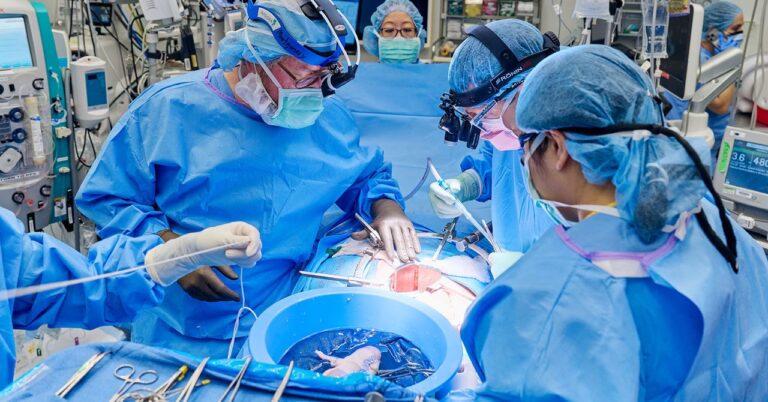New York surgeons removed a pig kidney less than two months after transplanting it into Lisa Pisano, a 54-year-old woman with kidney failure who also requires a mechanical heart pump. The transplant team says the problem is with the heart pump, not the pig’s kidney, and that the patient is in stable condition.
Pisano had heart and kidney failure and required regular dialysis, and several chronic conditions made his chances of a good outcome low and prevented him from receiving a traditional heart and kidney transplant from a donor.
Pisano first underwent heart pump surgery at NYU Langone Medical Center on April 4, followed by pig kidney transplant surgery on April 12. Heart pumps, called left ventricular assist devices (LVADs), are used by patients awaiting a heart transplant or who are not candidates for a heart transplant.
In a statement provided to WIRED, Pisano’s medical team explained that after several bouts of the heart pump not being able to pump enough blood to the transplanted kidney, they selectively removed the pig’s kidney on May 29, 47 days after the transplant. A steady flow of blood is essential for the kidneys to produce urine and filter waste products. Without it, Pisano’s kidney function began to decline.
“Taken together, the kidneys are no longer contributing enough to justify continued immunosuppressive therapy,” Robert Montgomery, director of the New York University Langone Transplant Institute, said in a statement. Like most transplant patients, Pisano needed to take immunosuppressants to prevent his immune system from rejecting the donor organ.
The kidney was taken from a pig that had been genetically engineered by Virginia biotech company Revivicor to lack the gene responsible for the production of a sugar called alpha-gal. In a previous study at NYU Langone, researchers found that removing the sugar could prevent the organ from being immediately rejected when transplanted into a brain-dead patient. Pisano’s surgery also included the donor pig’s thymus, which is responsible for “educating” the immune system, to reduce the chance of rejection.
A recent biopsy showed no signs of rejection, but Pisano’s kidneys had been damaged by a lack of blood flow, the statement said. Researchers will examine the pig kidneys in more detail after they are removed.
Pisano has now resumed dialysis, a treatment for kidney failure, and her heart pump is still functioning — though she would not have been a candidate for one had she not received the pig kidney.
“We hope that Lisa can be returned to her family soon,” Montgomery said, calling Pisano “a pioneer and a hero in the effort to create sustainable options for people waiting for organ transplants.”
Pisano is the second person to survive a genetically modified pig kidney transplant; the first was Richard Sulaiman of Massachusetts, who died in May, just two months after the historic transplant. The surgery took place at Massachusetts General Hospital on March 16. In a statement released on May 11, the hospital said there was “no indication” that Sulaiman’s death was the result of a pig kidney transplant. The donor pig used in Sulaiman’s surgery had a total of 69 different gene edits.
A global organ donor shortage has led researchers at New York University, the University of Massachusetts and elsewhere to explore the possibility of using pigs as an alternative source. But pig tissue is quickly recognized as foreign by the human body, so scientists are using gene editing to make pig organs more human-like to the immune system. Just how much gene editing would be required to make pig organs function in the human body is a topic of much debate.
Two pig heart transplants have also been performed at the University of Maryland, in 2022 and 2023, respectively. In both cases, the patients were ineligible for human heart transplants. The donor pigs had 10 gene edits and were also bred by Revivecor. The two transplant patients died approximately two months after the transplants.



